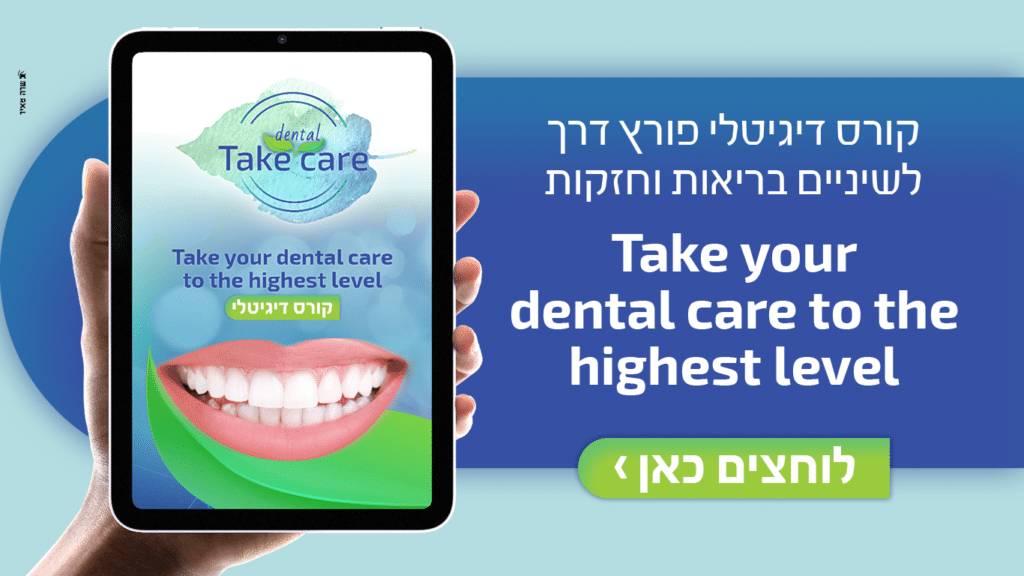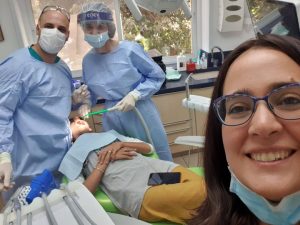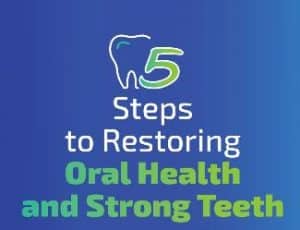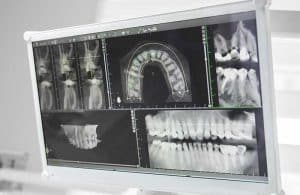Gingivitis - Table of contents
Gum treatment can be complex and engraved in memory as an unpleasant experience. At, our clinic, we do everything we can to tailor the treatment to the maximum of the therapist’s requirements while considering a variety of factors that allow us to provide our patients with comprehensive treatment. Complete dentistry includes treating many conditions, including gingivitis. Instead of letting pain manage you, you should manage the pain.
What is gingivitis?
Gingivitis is one of the most common infections in the population. The majority of the adult population worldwide suffers from gingivitis and bleeding gums – the first symptom of gingivitis.
There are two types of gingivitis, initial and chronic, with one leading to the other.
It is important to treat gingivitis as soon as the symptoms indicate it because initial gingivitis is much simpler to treat than chronic one. The chronic can lead to unwanted complications such as receding gums and damage to the tooth base and its support system, and in severe cases, even tooth loss.
Remember that if gingivitis is not treated properly, it can affect all body systems due to the diversity of blood vessels in the oral cavity. The inflammatory cells can migrate to various organs in the body and infect them with inflammation. In extreme cases, irreversible damage may be caused, and it is best to avoid unfortunate cases at an early stage.
What are the causes of gingivitis?
Gingivitis can be caused by various factors, including improper brushing of the teeth, resulting in an increase in bacteria in the oral cavity due to the accumulation of food and drink residues. Most of these bacteria go through a process called calcification and become what we know as tartar. Tartar is the leading cause of the development of gingivitis. However, habits like smoking can also influence the development of such inflammation.
Excessive consumption of sugary drinks can affect the appearance of inflammation as well, along with taking certain medications, piercing in the oral cavity, and dilation of blood vessels during pregnancy. There are also genetic factors and saliva composition that the patient does not influence. Still, it is important to diagnose the oral cavity, teeth, and gums to be aware of the level of risk for gingivitis.
What are the symptoms of gingivitis?
You should start to suspect that it is gingivitis as soon as you notice bleeding gums when brushing your teeth or when eating hard food, swelling in the gums, or mild pain in the gums. All of these can be a significant indication of the onset of inflammation. Other symptoms are redness in the gums, gum pain, bad breath, as well as a change in the taste sensations in the mouth.
Healthy gums will be a matte pink color that is not glossy and should be in an almost entirely flat structure. Any change in structure and color should light up in the patient as a warning that there is an ongoing of inflammation and it is advisable to see the dentist soon to treat it.
The most severe symptom imaginable following gingivitis is teething, drooping, or falling out teeth. This symptom indicates severe gingivitis and should be treated urgently to prevent tooth loss and entry into a therapeutic procedure of complex dental implants.
What is important to know about gingivitis?
The first important thing to know about gingivitis is that early treatment saves a lot of heartaches, damage, treatment time, and money. It is always better to diagnose it early and settle for a treatment that includes mouthwash or taking antibiotics.
If noticed after the deadline, it can lead to receding gums, displacement teeth, and new dental implants. It is also worth knowing that the chances of gingivitis can be significantly reduced if the following things are performed:
- Regular visits to a dental hygienist
- Daily flossing
- Brushing your teeth well, twice a day
Adherence to these three actions can help prevent gingivitis and save you a lot of time, money, and pain.
What type of gingivitis do I have?
There is mild gingivitis, which most of the population will experience during life, and it mainly includes discomfort when brushing teeth and light bleeding when brushing teeth or eating hard foods. It mainly damages the soft tissues of the gums and does not slide inward to the base of the tooth. There is no need to get excited about it; just go to the dentist and treat it.
Usually, a dental hygienist and regular rinsing will do the job, but sometimes the treatment of mild gingivitis will be with antibiotics. In any case, the dentist should be consulted for proper and individualized treatment, depending on the condition of the patient’s gums.
In other cases, where the mild gingivitis is untreated or undiagnosed, it worsens and becomes chronic gingivitis. With chronic gingivitis, the type of treatment is already different and is individually tailored according to the patient and his condition.
Chronic gingivitis affects the deep gingival tissues and bases of the teeth. It can especially spread in the oral cavity to put the teeth at risk of massive injury and even to shed. In such cases, we will turn to more complex treatment options than taking antibiotics, including tooth extraction, dental implants, and dental implant treatments.
One of the symptoms that can happen due to gum disease is receding gums. Gingival receding can also occur following massive brushing of the teeth, and at its base, it causes overexposure of the tooth base so that the teeth become sensitive to pain. At the same time, extreme sensitivity to hot or cold temperatures can develop. Any change in sensation in the oral and maxillofacial cavity should be treated to avoid unnecessary future complications.
How is gingivitis treated?
The attending physician will determine any treatment for mouth, teeth, jaw, and gum disease, depending on the condition in which the patient came to the clinic. The purpose of treating gingivitis is to clean the teeth from the accumulation of bacteria that cause tartar to accumulate in the oral cavity and, therefore, will include many mouthwashes and, if necessary, antibiotic treatment.
The goal of the treatment is to reduce the swelling in the gums, clean the bacterial deposits on the teeth and between them, encourage the reconnection of the gum tissue, and reduce as much as possible the risk of recurrent inflammatory infection. In most cases where the patient is diagnosed with mild gingivitis and in the initial stage, he will be referred for dental cleaning by a dental hygienist to deal with the accumulation of tartar and plaque in the oral cavity.
The duration of treatment can vary depending on the condition in which the patient came to the clinic and the severity of his gingivitis, and it can range from one session to several sessions.
How to prevent the recurrence of gingivitis?
With a few simple actions that will help keep your oral cavity clean and free of gingivitis, you can avoid in advance unpleasant procedures that can complicate and obscure daily life. In the initial stage, maintain regular visits to thoroughly clean the teeth, plaque and tartar.
The dentist should be consulted regarding the number of annual treatments, but most dentists will recommend visiting once every three months or six months, depending on the patient’s need. Adherence to this treatment routine will help diagnose gingivitis at an early stage, and its treatment will be simple, effective, and will last not last long.
In addition, brushing teeth properly will significantly reduce the need for in-depth and painful gum treatment at the dental hygienist or dentist. Ensuring that you brush your teeth twice a day for two minutes at a time will keep your teeth clean of tartar accumulations on a daily basis and between dental cleanings at the dental hygienist. Be sure to replace the toothbrush once every two to three months, as soon as the brush fibers begin to separate.
It is also important to use floss or toothpicks at least once a day to complete the brushing operation. The dental floss reaches the bacterial deposits and tartar that the toothbrush is unable to reach, so it is important to use it in order to complete the daily treatment of the teeth.
Make an appointment for effective treatment of gingivitis
At Dr. Sarit Avraham’s Dental Clinic, we believe that the wellbeing of our patients is paramount. With the help of our complete dental method, we diagnose and treat a variety of oral, dental, and gum diseases to bring about a state of complete health in the oral cavity.
Are you looking for a dentist in Jerusalem to help you with recurring toothaches? We are here for you, with a complete treatment plan that can include root canal treatment, scaling and polishing, dental implants, etc. We will create the system especially for you.
We can help with the rehabilitation of your mouth in a way that is adapted to your lifestyle and takes into account a variety of other factors that are not only the oral cavity but definitely affect it.
You are welcome to make an appointment for an initial consultation to begin a healthy process for treating gingivitis. You’ll be able to smile widely soon.

Dr Sarit Avraham
Dr. Avraham is a graduate of the Hadassah Medical Center School of Dental Medicine, and Works today as a Dentist in Jerusalem. She has an MSC in dental biomedical sciences and is a leader in holistic/integrative dental care in Israel. Dr. Avraham does a comprehensive, systematic examination of each case. She views the practice of dental medicine as an uncompromising branch that brings the oral health and physical health into a perfect balance and harmony.






